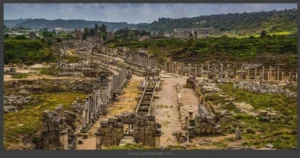
End of the Athenian Golden Age
How did the Athenian Golden Age end?
The Classical Period or Golden Age of Greece, From around 500 to 300 BC, was the golden age of Greece, which contributed to the foundations of the modern world’s architecture, philosophy, art, and literature.
During this time, Sparta and Athens were the most powerful and competitive city-states in Greece. Sparta wanted to weaken Athens. Athenians were victorious after the military victory over the Persians. (Corcoran. n.d) Sparta had the support of the Peloponnesian League, while Athens had Delian League’s help. The cold war between the two city-states finally broke out with the Peloponnesian War, which lasted 27 years (history.com. 2009). That was the first step toward the end of the Athenian golden age.
Among various chain events that unfold at the end of a golden age, the outbreak of a deadly plague was one of the table-changing events that weakened Athenian power. One-fourth of the Athenian army died from the disease, including Pericles, who was the wise leader behind Athen’s stable government.
With Pericles gone, the members of the assembly began to follow corrupt leaders, made poor decisions like invading Sicily, and finally surrendering to Sparta. Athens continued to exist under tyrants and oligarchy governments. But the once-great empire lost its supreme naval power in the region to Sparta. (history.com. 2009)
Corcoran (Corcoran. n.d) writes about the end of Athen’s golden age “Perhaps Athens overstepped its bounds and failed to follow the twin admonitions of Delphi- know thyself and All things in moderation. Perhaps, like Icarus, it tried to fly too close to the sun.”
In conclusion, the Peloponnesian War was the one circumstance that led to the end of the Golden Age of Greece.
Reference Sources for further reading:
- Peloponnesian War. (October 29, 2009). (URL)
- Corcoran, F. (n.d). The golden age of Greece. History Museum.Ca. (URL)
- BTS Dionysus – When Pop Music Met Greek Mythology

- The role of the polis in Archaic and Classical-era Greece

- Forms of Government in Ancient Greek

This article is written by:
Our professional writers and editors are passionate about sharing high-quality information and insights with our audience. We conduct diligent research, maintain fact-checking protocols, and prioritize accuracy and integrity to the best of our capacity.
You can cite our articles under the author name "Netizenme"






